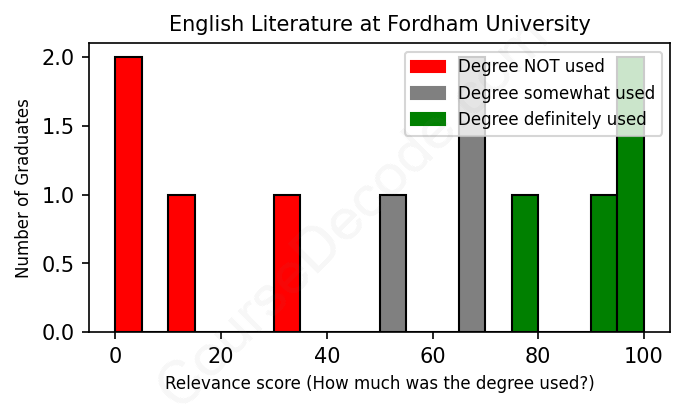
First, some facts. Of the English Literature graduates from Fordham University we've analyzed , here's how many have used (or NOT used) their degree in their career:

These are estimates based on AI analysis of 11 LinkedIn profiles (see below).
The verdict? Significantly below average. Overall, with an average relevance score of 53%, English Literature graduates from Fordham University have a much lower likelihood (-14%) of finding work in this field compared to the average graduate across all fields:
And for comparison, here's the chart for all profiles we've looked at across all degrees.
Also, after graduating, 45% of these graduates have pursued further education other than another Bachelor's degree (such as a Masters degree or other), compared to the average across all profiles of 35%. This suggests you may need more than just a Bachelors degree to be competitive as a English Literature graduate.
See the details:
|
Relevance score: 75% We think this person has gone into a career highly relevant to their degree. We think this person has gone into a career highly relevant to their degree.
DEGREE INFOGraduated in 2014 from Fordham University with a Bachelor of Arts (B.A.) in English Literature. No other secondary education since. JOB HISTORY SINCE GRADUATIONEditorial Assistant Benchmark Education Company Apr 2014 - Jul 2014 Associate Production Specialist  Benchmark Education Company Jul 2014 - May 2016 Content Creation Project Manager  Benchmark Education Company May 2016 - Sep 2016 Project Analyst (Project Coordination)  McGraw-Hill Education Sep 2016 - Present Production Management Supervisor  Benchmark Education Company Feb 2019 - Present ABOUTNo information provided. |
The top 10 most common jobs done by the graduates we've analyzed (ranked most common to least) are:
When looking at the career paths of people who graduated with a degree in English Literature from Fordham University, it seems like many have landed jobs in marketing, publishing, and writing-related fields. For instance, roles like Editorial Assistant, Marketing Interns, and Content Writers are pretty common. These positions often capitalize on the analytical and communication skills honed during their studies, making them quite relevant to English Literature. Jobs in companies like Penguin Random House and HarperCollins showcase how graduates are using their literary knowledge directly in the book industry.
However, the analysis reveals a significant portion of graduates also took on jobs that are only loosely connected to their English Literature background. Roles in customer service, project management, and even coordination tasks appear frequently, which don’t really rely on literary skills. While it's great to see some alumni thriving in fields closely related to their studies, it's also clear that a degree in English Literature doesn't guarantee a direct path into the literary world for everyone. So, while there are strong ties to literature in some jobs, many graduates find themselves in diverse roles that don’t specifically leverage their degree, which is a reality for many college grads no matter their major.
Here is a visual representation of the most common words in job titles for English Literature graduates (this is across all English Literature graduates we've analyzed, not just those who went to Fordham University):

Graduates from Fordham University with a degree in English Literature have pursued a mix of career paths that often reflect their interests in writing, communication, and the arts. For many of these alumni, their first jobs after graduation tend to be in positions related to publishing, education, or client services. Internships at publishing houses like Penguin Random House and roles in marketing for Book Publishers are common stepping stones, illustrating a desire to stay connected to literature and the written word. It’s clear that a significant number of graduates aim to work in fields that align closely with their academic training, especially those in editorial roles or marketing within the publishing industry.
However, as we look five to ten years down the line, the trajectories start to diversify a bit. While some graduates continue climbing the ranks in publishing or education, securing roles like Manager of Academic Marketing or Librarian positions, others have pivoted into different fields altogether, such as client success and team management in tech-related firms. This indicates a broader professional adaptability, where skills gained from an English Literature background—like critical thinking and communication—are being valued in diverse industries. That said, not all career moves are directly aligned with literary pursuits, and some graduates are in roles that might seem disconnected from their studies. Overall, there's a fair mix of success related to their degree and surprising detours into various professions, reflective of the versatility that comes with an English Literature education.
Getting a Bachelor’s degree in English Literature at Fordham University can be a bit of a mixed bag. It’s not considered the hardest degree out there, but it definitely requires a good amount of reading, writing, and analysis. You’ll be diving into a lot of classic and contemporary texts, which can be super rewarding, but it also means you’ll need to keep up with heavy reading loads and write some thoughtful essays. If you enjoy thinking critically about literature and discussing big ideas, you might find it manageable and even enjoyable. However, if the thought of tackling dense novels and crafting in-depth analyses sounds daunting, it might feel a bit challenging. Overall, it's probably about average in terms of difficulty compared to other humanities degrees.
Most commonly, in the LinkedIn profiles we've looked at, it takes people 4 years to finish a Bachelor degree in English Literature.
So, when you're checking out these Fordham grads' job paths, it looks like they've landed a mix of pretty decent gigs, but the pay kind of varies. The folks who stuck with big names like HarperCollins and Macmillan seem to be moving up the ladder, which usually comes with better pay. Someone at Indeed climbed through the ranks to a managerial position too, which is typically a sign of a higher paycheck. On the flip side, some of the earlier jobs, like working as a cashier or in internships, probably didn't pay much. Overall, it looks like the later career stages are where the money gets better, but the early years might not have brought in enough cash for these grads to feel super comfortable right out of school.
Here is a visual representation of the most common words seen in the "about" section of LinkedIn profiles who have a Bachelor degree in English Literature (this is across all English Literature graduates we've analyzed, not just those who went to Fordham University). This may or may not be useful:

Here are all colleges offering a Bachelor degree in English Literature (ordered by the average relevance score of their English Literature graduates, best to worst) where we have analyzed at least 10 of their graduates: